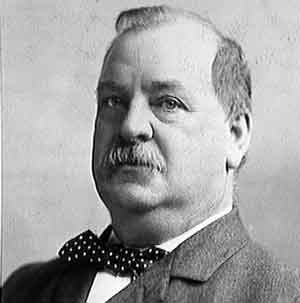Part 24 of My Presidential Review Series

Having a case of deja vu, we move on to Grover Cleveland. Is there anything left to say in this paragraph? Let's see...well, Cleveland had the youngest First Lady in history. He was the last Democrat elected to the presidency that was truly conservative. Um...I'm out. He served March 4, 1893 to March 3, 1897 for his second term.
Cleveland condemned American involvement in the overthrow of Queen Liliuokalani of Hawaii and withdrew the annexation treaty from consideration by the Senate.
The Panic of 1893, caused by the failure of the Philadelphia and Reading Railroad in February 1893, was followed by a four-year depression. Underlying causes were rapidly decreasing gold reserves, industrial overexpansion, poor crop harvests in the South and West, and an economic slump in Europe. Thousands of business (including a quarter of the railroads) worth hundreds of millions of dollars went bankrupt. Riots broke out in Chicago. Jacob Coxey organized 100 jobless for a march on Washington in Massillon, Ohio. By the time they got there, their numbers had swelled to 500, all of whom unsuccesfully petitioned for a $500 million public works program.
Certain that the Sherman Silver Purchase Act was mostly responsible for the worryingly low federal gold reserves, Cleveland called a special session of Congress to urge its repeal. Congress agreed, but only after fierce debate that divided the Democratic party into eastern goldbugs and the silver wing of the West and South that would launch young William Jennings Bryan to the presidential race in 1896. Cleveland believed that only the gold standard could provide a stable currency. When gold reserves continued to dwindle, he sold gold bonds at a discount to J. P. Morgan and other Wall Street bankers in return for cooperation in checking the decline of gold. This action further alienated him from the Populist elements in the party.
Democratic Representative William L. Wilson of West Virginia put forth a tariff that sharply reduced the rates in the McKinley Tariff, but forces in the Senate led by Democrat Arthur P. Gorman of Maryland added duties on many goods. Cleveland denounced the package but allowed it to become law without his signature. Overall, the Wilson-Gorman Tariff reduced rates to 41%. It also provided for a federal income tax, which was declared unconstitutional by the Supreme Court in 1895. It was replaced by the Dingley Tariff.
In response to the deteriorating economic conditions in the wake of the Panic of 1893, the Pullman Palace Car Company greatly reduced employee wages while mantaining rents and prices of goods in company towns. A strike resulted and quickly spread to other railroad companies. Under the leadership of Eugene V. Debs, who had formed the American Railway Union, strikers managed to almost completely halt traffic between Chicago and the West Coast. Debs was careful, however, to make sure that the mail was not disrupted, as doing so could bring the federal government against them. When violence broke out, railroad executives appealed to the federal government. On the advice of Attorney General Richard Olney, Cleveland won an injunction and, over the protests of Governor John P. Altgeld, dispatched troops to Illinois on the ground that they were unlawfully obstructing the mail. The strike was broken, and Debs was arrested for violating the injunction.
Cleveland backed Secretary of State Richard Olney in aggresively attempting to persuade Great Britain to submit the boundary arguement between its colony of Guiana and Venezuela to arbitration. Partly at U.S. insistence, partly due to other foreign policy considerations, Britain agreed to arbitration by an international tribune, which decided the question mostly in Britain's favor in 1899.
Cleveland died on June 24, 1908.
Cleveland did quite a few things in his two terms. His first was a rather average term; he did a few small good things but nothing big. His second had some important events. His repeal of the Sherman Silver Purchase Act was a step towards helping end the depression, and he at least tried to reduce the tariff. His breaking of the Pullman Strike, though, I do find a bad move on his part. The Panic and resulting depression weren't really his fault. In the end, his terms average out to a little better than average.
Overall Ranking: 19
"A government for the people must depend for its success on the intelligence, the morality, the justice, and the interest of the people themselves."